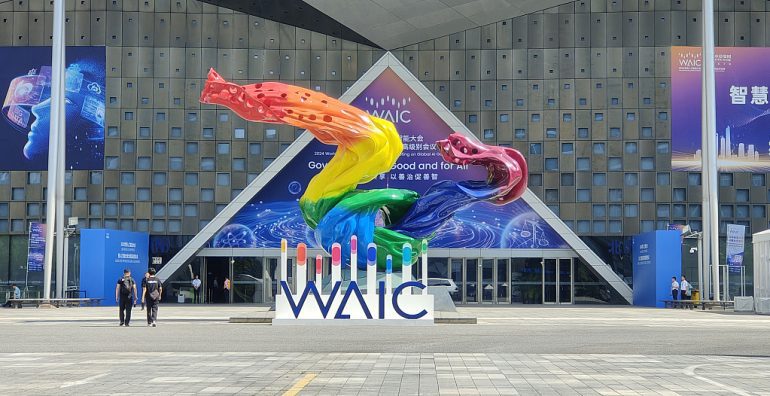- Sixth World Artificial Intelligence Conference held in Shanghai, July 4-7.
- Over 500 companies showcased AI innovations in language models, machine learning, and applications in consumer electronics, healthcare, and industrial sectors.
- Participants included global giants like Amazon Web Services, Google, and Tesla alongside Chinese tech leaders Alibaba, Baidu, and Tencent.
- Event featured matchmaking between 100 start-ups and 100 investors, focusing on fintech, smart devices, and scientific applications.
- Robot exhibition highlighted advanced humanoid and specialized robots from global and Chinese manufacturers.
- Key innovations included large language models deployed in sectors like government, healthcare, and manufacturing.
Main AI News:
The sixth World Artificial Intelligence Conference, held at the Shanghai World Expo Exhibition and Convention Center from July 4-7, underscored China’s burgeoning role as a major player in the global AI landscape. Over 500 companies, spanning large language models, machine learning applications, AI in consumer electronics, healthcare innovations, industrial automation, robotics, and autonomous vehicles, participated in the event, showcasing their cutting-edge technologies.
While the majority of exhibitors were Chinese firms, global tech giants like Amazon Web Services, Dell, GE, GM, Google, Microsoft, Tesla, and Qualcomm also drew significant attention. Participants ranged from industry leaders Alibaba, Baidu, Huawei, and Tencent to prominent hardware manufacturers like Lenovo and ZTE, along with major telecom operators China Mobile, China Telecom, and China Unicom, and a multitude of AI software and service providers.
A highlight of the event was the matchmaking section, where 100 start-ups from around the globe connected with 100 investors representing venture funds, private equity firms, state-owned enterprises, and publicly traded companies. Key investment areas included fintech, smart devices, intelligent transportation, low-orbit economy applications, and scientific advancements.
The Comprehensive Connection Hub facilitated introductions between AI project leaders and potential investors and buyers. Meanwhile, the AI+ Application Scenarios Comprehensive Zone featured diverse applications from China and nearly 20 other countries, demonstrating the global reach and potential collaborations in AI technologies.
The robot exhibition featured over 20 humanoid robots from companies such as Data Robotics, Deep Robotics, Robot Era, Fourier Intelligence, Unitree, and Tesla, showcasing advanced capabilities like Tesla’s Optimus Gen 2. The event also highlighted China’s vibrant open-source community in humanoid robotics, presenting a variety of robots from quadrupeds to agile fixed robots.
The significance of large language models and their creators in China’s AI landscape was evident throughout the conference. Notably, models like China Mobile’s “Jiutian Base Model” and China Unicom’s “Yuanjing ‘1+1+M’ LLM system” were highlighted for their widespread adoption in sectors ranging from government and healthcare to corporate enterprises. Additionally, state-owned enterprises like CITIC Group showcased innovative applications such as the “Lighthouse Factory,” an internet-based manufacturing system tailored for the special steel industry.
Collaborative efforts between global players like Google and local institutions were also showcased, such as the integration of Dunhuang mural patterns into modern clothing designs using Google’s open-source machine learning software library. This collaboration underscores China’s integration of cultural heritage with modern technological advancements.
The event saw over 15 Chinese companies presenting new large language models and innovative AI applications, further solidifying their role in shaping the future of AI technologies globally. These companies, although not widely recognized outside of China, are poised to make significant strides in the AI arena, showcasing the rapid growth and ambitious scale of China’s AI ecosystem.
Reflecting on the event, Alibaba Group chairman Joe Tsai emphasized China’s progress in AI, noting that while challenges like US export restrictions on advanced GPUs persist, Chinese innovation continues to accelerate. With Shanghai emerging as a hub for AI innovation, housing over 80 enterprises dedicated to AI model development and boasting a growing workforce, China’s AI sector is positioned at the forefront of global advancements, potentially rivaling and even surpassing its US counterparts in practical AI applications.
Conclusion:
China’s dominant presence at the Shanghai AI Expo underscores its rapid advancement and global competitiveness in AI technologies. The event highlighted not only technological innovations across sectors like healthcare and robotics but also strategic collaborations and investments driving China’s AI leadership. This signifies a pivotal shift in the global AI market dynamics, with China poised to lead in both technological innovation and practical applications, potentially reshaping global industry standards and competition.

